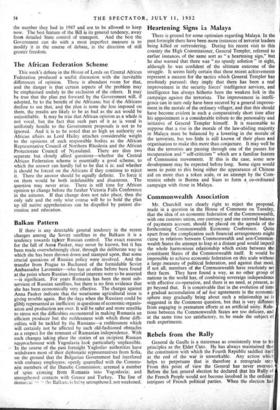Balkan Pattern
If there is any detectable general tendency in the recent changes among the Soviet satellites in the Balkans it is a tendency towards tighter Russian control. The exact reasons for the fall of Anna Pauker, may never be known, but it has been made overwhelmingly clear, through the deliberate way in which she has been thrown down and stamped upon, that some crucial questions of Russian policy were involved. And the transfer from Prague to Bucharest of the formidable Soviet Ambassador Lavrentiev—who has so often before been found at the point where Russian imperial interests were to be asserted —is significant. For years Rumania has been the most sub- servient of Russian satellites, but there is no firm evidence that She has been economically very effective. The charges against Anna Pauker indicate that the wearisome agricultural issue is giving trouble again. But the days when the Russians could be glibly represented as inefficient in questions of economic organis- ation and production are over. It will be safer and more sensible to stress not the difficulties encountered in making Rumania an efficient producer but the ruthlessness with which those diffi- culties will be tackled by the Russians—a ruthlessness which will certainly not be affected by such old-fashioned obstacles as a respect for the remnant of Rumanian independence. With such changes taking place the stories of an incipient Russian rapprochement with Yugoslavia look particularly unplausible.
-- In the course of the past fortnight Yugloslav authorities have withdrawn most of their diplomatic representatives from Sofia, on the ground that the Bulgarian Government had interfered with embassy employees; openly quarrelled with the Commu- nist members of the Danube Commission; arrested a number of spies crossing from Rumania into Yugoslavia; and strengthened contacts with Greece and Turkey. The line of demarcat*--, •-• the Balkans is being strengthened, not weakened.







































 Previous page
Previous page